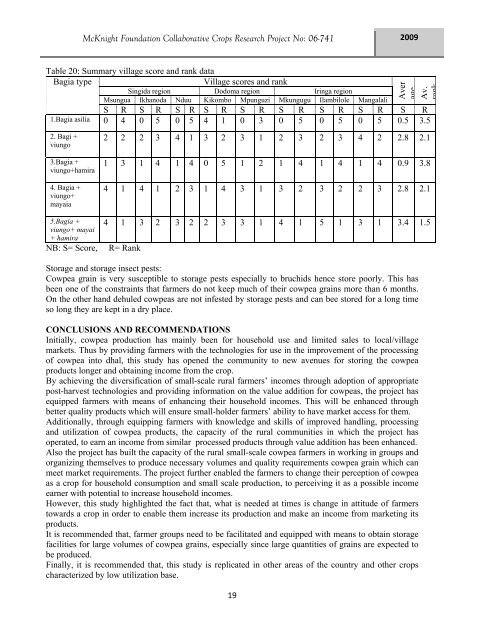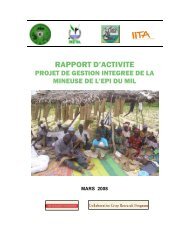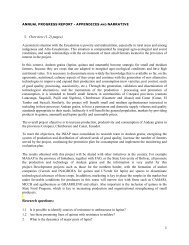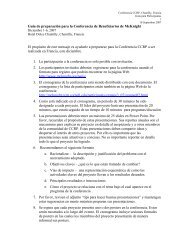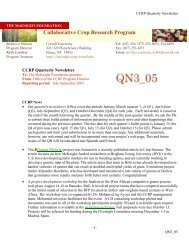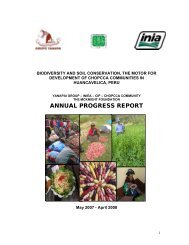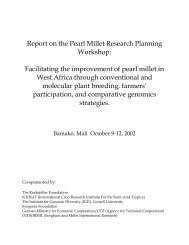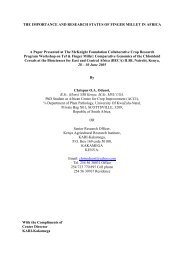English - McKnight Foundation Collaborative Crop Research Program
English - McKnight Foundation Collaborative Crop Research Program
English - McKnight Foundation Collaborative Crop Research Program
Create successful ePaper yourself
Turn your PDF publications into a flip-book with our unique Google optimized e-Paper software.
<strong>McKnight</strong> <strong>Foundation</strong> <strong>Collaborative</strong> <strong>Crop</strong>s <strong>Research</strong> Project No: 06-741<br />
Table 20: Summary village score and rank data<br />
Bagia type Village scores and rank<br />
Singida region Dodoma region Iringa region<br />
Msungua Ikhanoda Nduu Kikombo Mpunguzi Mkungugu Ilambilole Mangalali<br />
S R S R S R S R S R S R S R S R S R<br />
1.Bagia asilia 0 4 0 5 0 5 4 1 0 3 0 5 0 5 0 5 0.5 3.5<br />
2. Bagi +<br />
viungo<br />
3.Bagia +<br />
viungo+hamira<br />
4. Bagia +<br />
viungo+<br />
mayaia<br />
19<br />
2009<br />
Aver<br />
age<br />
Av.<br />
rank<br />
2 2 2 3 4 1 3 2 3 1 2 3 2 3 4 2 2.8 2.1<br />
1 3 1 4 1 4 0 5 1 2 1 4 1 4 1 4 0.9 3.8<br />
4 1 4 1 2 3 1 4 3 1 3 2 3 2 2 3 2.8 2.1<br />
5.Bagia +<br />
viungo+ mayai<br />
+ hamira<br />
4 1 3 2 3 2 2 3 3 1 4 1 5 1 3 1 3.4 1.5<br />
NB: S= Score, R= Rank<br />
Storage and storage insect pests:<br />
Cowpea grain is very susceptible to storage pests especially to bruchids hence store poorly. This has<br />
been one of the constraints that farmers do not keep much of their cowpea grains more than 6 months.<br />
On the other hand dehuled cowpeas are not infested by storage pests and can bee stored for a long time<br />
so long they are kept in a dry place.<br />
CONCLUSIONS AND RECOMMENDATIONS<br />
Initially, cowpea production has mainly been for household use and limited sales to local/village<br />
markets. Thus by providing farmers with the technologies for use in the improvement of the processing<br />
of cowpea into dhal, this study has opened the community to new avenues for storing the cowpea<br />
products longer and obtaining income from the crop.<br />
By achieving the diversification of small-scale rural farmers’ incomes through adoption of appropriate<br />
post-harvest technologies and providing information on the value addition for cowpeas, the project has<br />
equipped farmers with means of enhancing their household incomes. This will be enhanced through<br />
better quality products which will ensure small-holder farmers’ ability to have market access for them.<br />
Additionally, through equipping farmers with knowledge and skills of improved handling, processing<br />
and utilization of cowpea products, the capacity of the rural communities in which the project has<br />
operated, to earn an income from similar processed products through value addition has been enhanced.<br />
Also the project has built the capacity of the rural small-scale cowpea farmers in working in groups and<br />
organizing themselves to produce necessary volumes and quality requirements cowpea grain which can<br />
meet market requirements. The project further enabled the farmers to change their perception of cowpea<br />
as a crop for household consumption and small scale production, to perceiving it as a possible income<br />
earner with potential to increase household incomes.<br />
However, this study highlighted the fact that, what is needed at times is change in attitude of farmers<br />
towards a crop in order to enable them increase its production and make an income from marketing its<br />
products.<br />
It is recommended that, farmer groups need to be facilitated and equipped with means to obtain storage<br />
facilities for large volumes of cowpea grains, especially since large quantities of grains are expected to<br />
be produced.<br />
Finally, it is recommended that, this study is replicated in other areas of the country and other crops<br />
characterized by low utilization base.


